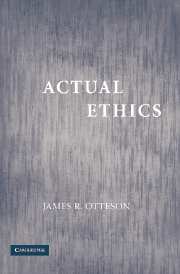Book contents
7 - Moral Hobgoblins: Inclusion and Exclusion
Published online by Cambridge University Press: 17 November 2009
Summary
A number of issues that currently occupy a large place in discussions about ethics, particularly discussions about “practical” or “applied” ethics, are rendered significantly less prickly and intractable if we apply the concepts and tools developed in Part I of this book. Thus if we keep in mind the central principles of what it means to be a person, what judgment is, and what are matters of justice and what are matters of other virtues, I think we shall find we can navigate many new and unfamiliar waters with confidence. Let us then take up a few of these vexed issues and see, based on the tools we have, what we can make of them. In this chapter the focus is a few of the ways human beings include or exclude others.
WATCH YOUR LANGUAGE
Let us begin with an issue that, if judged by the number of people who address it in one way or another, is of great general concern: gender-specific, or gender-exclusive, language. Worry about things like whether writers use a “generic ‘he’” relies on the fallacy that words determine reality, rather than the other way around. If I refer to you as the chairman of my department, I am not asserting that you are a chair, or a man, or some combination: I am asserting that you are the head or leader or director of my department. Your sex is not implicated in the term, any more than whether you are a piece of furniture is.
- Type
- Chapter
- Information
- Actual Ethics , pp. 243 - 277Publisher: Cambridge University PressPrint publication year: 2006



